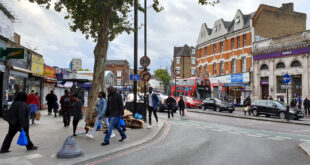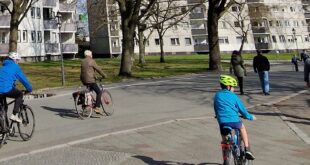People of African descent experience racism and discrimination in Germany than in many other European countries. That is the result of a study, titled Being Black in the EU: The Experience of People of African Descent, conducted by the European Agency for Fundamental Rights (FRA).
The report is based on interviews with 6,752 people of African descent in Austria, Belgium, Denmark, Finland, France, Germany, Ireland, Italy, Luxembourg, Poland, Portugal, Spain and Sweden.
Nearly half of those surveyed said they were confronted with racism and discrimination in their daily lives, the FRA announced on Wednesday while presenting the study. Germany is the inglorious front-runner in this respect with 76 per cent, Austria scores similarly poorly at 72 per cent.
According to the study, more than one in two participants in the survey in Germany had experienced racial harassment in the five years prior to the survey and almost one in ten had even experienced violence. In this category, too, Germany is worse off than most or even all European countries surveyed.

Skin colour is a particular issue when looking for work and housing, the report says, as more than half of the Black people surveyed in Germany felt discriminated against when looking for work.
Germany also performed poorly when it comes to their experiences in the areas of health and education. In schools, according to the study, almost 40 per cent of Black students face racist insults or threats, similar to Ireland, Finland and Austria.
The latest study is FRA’s second ‘Being Black in the EU’ report to highlight the experiences of people of African descent in the EU.
“It is shocking to see no improvement since our last survey in 2016. Instead, people of African descent face ever more discrimination just because of the colour of their skin,” FRA Director Michael O’Flaherty said.
“Racism and discrimination should have no place in our societies. The EU and its Member States should use these findings to better target their efforts and ensure people of African descent too can enjoy their rights freely without racism and discrimination,” he added.
Here are the highlights of the report:
- Racial discrimination – 45% of respondents say they experienced racial discrimination in the 5 years before the survey, an increase compared to 39% in FRA’s last survey. In Germany and Austria, it goes over 70%. Most often, they are discriminated against when looking for work or searching for accommodation. Young people and people with higher education are most affected. Yet, discrimination remains invisible as only 9% report it.
- Harassment – 30% say they experienced racist harassment but almost no one reports it. Young women, people with higher education and those wearing religious clothing are more likely to be racially harassed.
- Racial profiling – 58% say that their most recent police stop in the year before the survey was a result of racial profiling. Those who perceive their stop as racial profiling trust the police much less.
- Work – 34% felt racially discriminated against when looking for a job and 31% at work in the 5 years before the survey. Compared to people generally, they are more likely to have only temporary contracts and are over-qualified for their job.
- Housing and poverty – rising inflation and cost of living have put more people of African descent at higher risk of poverty, compared to the general population. Some 33% face difficulties to make ends meet and 14% cannot afford to keep their house warm, compared with 18% and 7% of people generally. Simply finding a place to live is a struggle for many, with 31% saying they were racially discriminated against when trying to find accommodation.
- Education – young people of African descent are three times more likely to leave school early, compared to young people generally. More parents in 2022 say that their children experienced racism at school than in 2016.
To tackle racism and discrimination effectively, FRA calls on EU countries to:
– properly enforce anti-discrimination legislation as well as effective, proportionate and dissuasive sanctions;
– identify and record hate crimes, and consider bias motivation as an aggravating circumstance when determining penalties;
– collect equality data, including on ‘ethnic or racial origin’ to assess the situation and monitor progress;
– ensure that equality bodies have the necessary mandates and resources to tackle discrimination and support victims;
– take steps to prevent and eradicate discriminatory institutional practices and culture in policing, drawing on FRA’s guide on preventing unlawful profiling;
– develop specific policies to address racism and racial discrimination in education, employment, housing and healthcare.
The study is FRA’s third large-scale survey on immigrants and the descendants of immigrants across the EU to provide crucial insights into experiences of discrimination and racism. “It shows that, despite binding anti-discrimination law in the EU since 2000 and significant policy developments since then, people of African descent continue to face racism, discrimination and hate crime,” FRA said.
“Without this much needed data, racial discrimination remains invisible. FRA’s findings support developing a better understanding of the experiences of people of African descent in the EU and promote action on equality and inclusion.”
Femi Awoniyi
Download the report Being Black in the EU: The Experience of People of African Descent HERE
 THE AFRICAN COURIER. Reporting Africa and its Diaspora! The African Courier is an international magazine published in Germany to report on Africa and the Diaspora African experience. The first issue of the bimonthly magazine appeared on the newsstands on 15 February 1998. The African Courier is a communication forum for European-African political, economic and cultural exchanges, and a voice for Africa in Europe.
THE AFRICAN COURIER. Reporting Africa and its Diaspora! The African Courier is an international magazine published in Germany to report on Africa and the Diaspora African experience. The first issue of the bimonthly magazine appeared on the newsstands on 15 February 1998. The African Courier is a communication forum for European-African political, economic and cultural exchanges, and a voice for Africa in Europe.






























